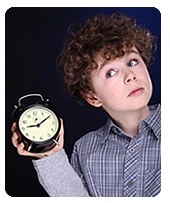"Go to Bed NOW!" Winning the Bedtime Battle with Young Kids
As every parent knows, fights over bedtime can be one of the biggest power struggles you'll have with your child, whether they're five or fifteen. The truth is, many kids just don't want to go to bed at night. For most of them, I think it's because they're afraid they're going to miss something. With others, it might be because they're frightened of the dark, or afraid to go to sleep. And for some kids, they simply want to be in control. Bedtime just becomes another arena in which kids will try to fight with you. If you've ruled out fear of the dark, fear of bedwetting, and fear of not waking up, that leaves us with -the power struggle.

First of all, as in any power struggle, we don't want to engage in a fight if we can possibly avoid it. That means that if we implement a new program, we may get a fight at first-and by the way, it might be a very serious or forceful one. My advice is that you try not to personalize it and instead, realize that this is a matter of your child meeting their responsibilities. In other words, the focus should be on your child learning how to manage himself through meeting his responsibilities and not on your child learning to manage you through power plays.
Realize that the problem-solving skills of younger kids are less evolved; they often have problems with impulsivity and frustration control. If going to bed is frustrating for them, it's likely that their behavior is going to escalate into an unpleasant situation. So the first rule is, don't make bedtime unpleasant. Make no mistake, I'm not saying make it pleasant by talking sweet or bribing them. I'm saying don't make it unpleasant by looking for an argument. Don't make it into a self-fulfilling prophecy and expect them to fight with you because that's what they've done in the past.
** Have Quiet Time before Bedtime - as the house winds down before bedtime, there should be quiet time.Any TV or DVDs watched by your child should be screened for mellowness and simplicity. No video games or computer a half hour before bedtime. Ideally, bedtime should be a time of quiet in the house-dad shouldn't be building a chair in the garage, mom shouldn't be slamming around in the kitchen, and other siblings should not be screaming and yelling or laughing loudly.
** Have Your Child Set Their Own Alarm Clock - When kids begin pre-school or kindergarten, they should get an alarm clock. Part of the ritual of getting up is that we set the alarm clock at night when we go to bed. That way, you get your child to take responsibility as soon as they have some place they need to go. This is basic behavioral training, and it's effective in getting kids into the routine of waking up in the morning.
** Use a Star Chart to Get Kids Focused on Good Nighttime Behavior - Your child has two ways to get rewarded here: if they get a certain percentage of stars each day, they get a reward that night, and if it's weekly, they get it that weekend. The reward on the weekend has to be something special with an adult. Like they go have an ice cream cone with dad, or go to a movie with both parents. The daily reward might be some extra video game time or the ability to stay up half-an-hour later. The reason we do it incrementally is that your child almost always has a chance to succeed and can almost always start over.
** Use Soft Lights 30 Minutes Prior to Bedtime - Leave on a soft light in the room for half-an-hour before lights out. For younger kids under eleven, reading is a good way to fall asleep. It clears their mind and is soothing. It also gives them some power of choice. Now, if you give that as an option to your kids, the good news is if they don't get up on time in the morning, that's the first thing you can take away: It becomes the consequence for not getting up. And not only do they get a dot on their chart, they hear, "You're going to have your lights out with no reading time until you get up on time for two days." Be sure to add, "After two days, we'll try it again."
A word of advice here: always keep a light at the end of the tunnel for kids. If you make them feel powerless, it will encourage them to engage in power struggles with you.
Courtesy of: EmpoweringParents.com
|
Join Us for
Smart Summertime Fun
at Barrington !
|
|
|
10 Ways to Be a More Positive Parent
1. Stay Positive with Safety
Provide your child with clear rules around safety topics, as well as the reasons for the rules, and always put a positive spin on your language. For instance, say, "Please walk," instead of "Don't run!"
2. Listen and Respond
Use responsive language. If your child does or says something you don't agree with, talk to him in a clear and non-accusatory way, rather than simply directing him. Listen attentively, and explain why you'd like him to follow your rule. Verbal guidance can be something like, "Walk to the bus so that you stay safe and don't fall."
3. Set A Good Example
As you show your child what you'd like him to do, explain why you're doing what you're doing. Providing explanations is very helpful when teaching patience and social skills, and helps kids connect their feelings with words. "It's really hard for me to wait for a turn on the swing. I want to run up there right now, but I'll wait until Sarah's done."
4. Reinforce Positive Behavior
Teaching a new behavior? Make sure to reinforce what you'd like him to do each time it occurs. Immediate and continuous praise-a smile, a pat on the back, stickers or a special activity can go a long way.
5. Provide Specific Compliments
Make praise specific, descriptive and explicit. Instead of saying, "Great," say, "Tina, it's terrific that you remembered to clean your room before playing with your dolls." This meaningful feedback will nurture self-confidence.
Instead of emphasizing the end product-"What a beautiful picture"-focus on the process: "You put a lot of effort in your painting, especially with how you used the blue paint."
Want to know more? This article will conclude in our next Enews issue...Stay tuned ...
|
10 Best Books for
Thinking Parents
I geek out about books that help me understand my kids' brains and how I can facilitate learning, growth, and creativity. Since I read so many books, I thought you might like to know my very favorite books for parents. Are they parenting books? Maybe. I'd say they are books for thinking parents about kids. Read liberally. Ponder. Apply as needed.
1. Mind in the Making: The Seven Essential Life Skills Every Child Needs by Ellen Galinsky
2. NurtureShock: New Thinking About Children by Po Bronson and Ashley Merryman
3. Smart Parenting for Smart Kids: Nurturing Your Child's True Potential by Eileen Kennedy Moore, PhD Mark S Lowenthal, PsyD
4. Playful Learning: Develop Your Child's Sense of Joy and Wonder by Mariah Bruehl
5. Einstein Never Used Flashcards: How Our Children Really Learn - and Why They Need to Play More and Memorize Less by Kathy Hirsh-Pasek, Ph.D. & Roberta Michnick Golinkoff, Ph.D.
6. Brain Rules for Baby: How to Raise a Smart and Happy Child from Zero to Five by John Medina
7. No Regrets Parenting: Turning Long Days and Short Years into Cherished Moments with Your Kids by Harley Robart, M.D.
8. Different Learners: Identifying, Preventing, and Treating Your Child's Learning Problems by Jane M. Healy, Ph.D.
9. Simplicity Parenting: Using the Extraordinary Power of Less to Raise Calmer, Happier, and More Secure Kids by Kim John Payne and Lisa M. Ross
10. Fun On the Run by Cynthia L. Copeland
Courtesy of Parenting.com
|
|
|
BARRY HAS TONS OF NEW BOOKS AND ACTIVITIES IN STORE FOR YOUR FAMILY FOR APRIL...Click on Barry to visit him in his corner !
|
What's Up at Barrington?
Picture Day is April 16-17
SPRING BACKGROUNDS
AND CAP & GOWN
PHOTOS
Blood Drive is April 23 2:00-6:00pm
GIVE THE GIFT OF LIFE
THIS SPRING... DONATE AT
OUR BLOOD DRIVE.
|
April is National
Pet Month !!
 |
| Laurie Berkner "The Cat Came Back" |
|

Join Our Mailing List |
|
 |
Find out what parents are saying about us |
|
|
|
Let's
"Play Ball"...

We want to see everyone out at the field this spring to support our very own BARRINGTON BEARS !!
March through May at Cochran Park...See our FaceBook page for the game schedule.
|
Brainy Bees...
Learn Your Numbers
|
My Dog Fred
A Funny Dog and Cat Poem for Kids

I have a dog.
His name is Fred.
He won't play fetch.
He won't play dead.
He won't shake hands
or sit or stay
or bark or beg
or run and play.
He won't roll over,
shake or crawl.
In fact, he won't
do tricks at all.
When folks ask why
I tell them that's
because my dog
was raised by cats.
--Kenn Nesbitt
|
"Anyone who stops learning is old, whether at twenty or eighty. Anyone who keeps learning stays young. The greatest thing in life is to keep your mind young."
|
|
|

